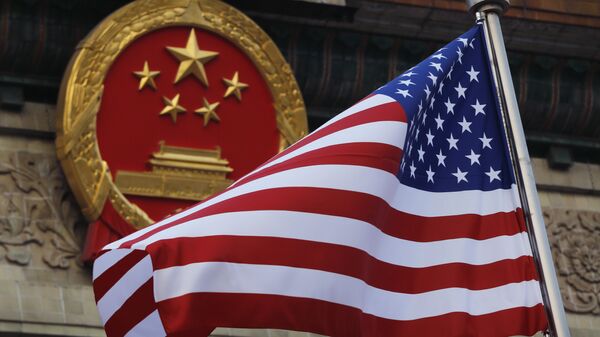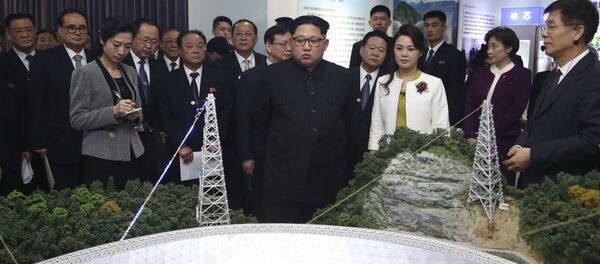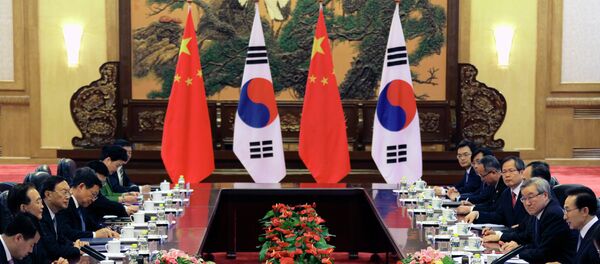Bilateral relations between China and Japan warmed significantly in recent months, following years of tensions over the disputed Senkaku Islands, known as Diaoyu Islands in Chinese, after Japanese Prime Minister Shinzo Abe announced the nationalization of the islands in 2012.
When Chinese Foreign Minister Wang Yi met with his Japanese counterpart Taro Kono in August last year, the Chinese diplomat expressed disappointment over Kono’s earlier statements regarding China’s military expansion in the South China Sea and accused the Japanese diplomat of "fulfilling a mission assigned by the United States."
READ MORE: China's Xi Jinping Met With North Korea's Kim Jong-un in China
However, when Wang visited Tokyo and met with Kono again in April this year, making him the first Chinese foreign minister to visit Japan in nine years, both sides agreed to "reset" bilateral relations. Amid warming ties between the two nations, Chinese Premier Li Keqiang kicked off his first official visit to Japan, after taking office as premier in 2013, on Tuesday.
In addition to repairing relations with Japan, China also tried to make amends with India by inviting Indian Prime Minister Narendra Modi for a summit with Chinese President Xi Jinping in Wuhan in Central China in late April, after an almost 3-month military standoff last summer over a border dispute further strained bilateral ties between Beijing and New Delhi.
China Not Alone
China’s efforts in repairing relations with neighboring countries can be interpreted as a clear message to the United States, after US President Donald Trump unveiled a series of hostile policies targeting Beijing, especially with threats of a trade war in recent months, experts told Sputnik.
READ MORE: Two Koreas, One Yuan? China to Play Key Role in Korean Economic Unification
"China’s tense relations with neighboring countries, including Japan and India, have eased dramatically this year. This is a clear message to Washington: even if the Trump administration introduces a lot of policies that is hostile toward Beijing, China is not standing helplessly alone. For Beijing, it’s impossible to continue the kind of tension with neighboring countries including Japan, India, South Korea or even North Korea, like it did in recent years. By improving relations with those countries, Beijing wants to tell Washington that the United States cannot isolate China," Ding Xueliang, a political analyst and a social science professor at the Hong Kong University of Science and Technology, said.
"No one can predict Trump’s next move. Beijing needs to prepare for the worst scenario. Under previous US administrations, Chinese leaders have discovered a pattern of US policies against China. During elections, most US politicians would make tough comments. During the US president’s first year in office, there will be frictions. Tensions will ease in the second year and the United States will start to do business with China in the new US president’s third year in office. This pattern is very familiar to Chinese leaders. Trump made friendly comments toward China as soon as his took office, even calling Xi his good friend. But it didn’t stop him from making troubles with China. Trump’s actions can be viewed as very unreliable in Chinese culture. All the previous experiences Beijing accumulated in dealing with Washington look to be completely useless today," Ding said.
READ MORE: Trade Dispute With US Can Fuel China's Conversion From Workshop to Brain Trust
The expert added that Chinese leaders understand that leaders in neighboring countries probably share a similar concern over Trump’s unpredictability.
"Chinese leaders have confidence in their new foreign policy [in improving relations with neighboring countries] because they understand that none of the leaders in those countries can predict what Trump’s next move is," he said.
No China Threat
Following growing tensions with neighboring countries including Japan, India and South Korea in recent years, Chinese leaders needed to adjust foreign policies to avoid the rising rhetoric in the West about the "China Threat Theory," political analysts told Sputnik.
"Since the 18th National Congress of the Communist Party of China [in 2012], China’s relationship with several big neighboring countries was not very good. This was not a favorable environment for the nation’s growth and development. The ‘China Threat Theory’ also started to rise in the international community. One of the arguments for this theory is that China has strained relations with most of its neighbors. To avoid accusations of China seeking hegemony, Chinese leaders understood it’s necessary to improve relations with its neighbors first," Deng Yuwen, a senior researcher at the Charhar Institute Beijing, told Sputnik.
The Beijing-based scholar added that tensions with neighboring countries could divert attention from domestic problems that need to be addressed properly in China.
"Tensions with neighbors consume a lot of energy, which could be better spent on solving problems in domestic development in China. It is also not helpful in promoting China’s worldviews in the international community," Deng said.
Term Limits
Despite the fact that leaders of neighboring countries understand China’s motives in repairing bilateral relations, a limited term in office for those leaders makes it easy for them to seek short-term benefits from mending ties with Beijing, professor Ding from the Hong Kong University of Science and Technology pointed out.
Ding added that Trump’s policies toward allies such as Japan also made Abe understand that it was necessary to have a backup plan, as he no longer can rely solely on the US-Japan alliance.
Japanese scholars argued that it is easy for both China and Japan to find common ground to improve bilateral relations.
"China and Japan are mutually dependent in terms of economy. Japan makes a lot of money from Chinese tourists visiting the country. Industrial structures of the two nations are also complementary to each other. Both countries need improved bilateral relations both economically and politically," Noboru Yamaguchi, a professor of international relations at the International University of Japan in Niigata, told Sputnik.
Professor Yamaguchi added that leaders of both nations understand that it is the right time to move away from confrontational attitude and work with each other.
The views and opinions expressed by the speakers do not necessarily reflect those of Sputnik.



